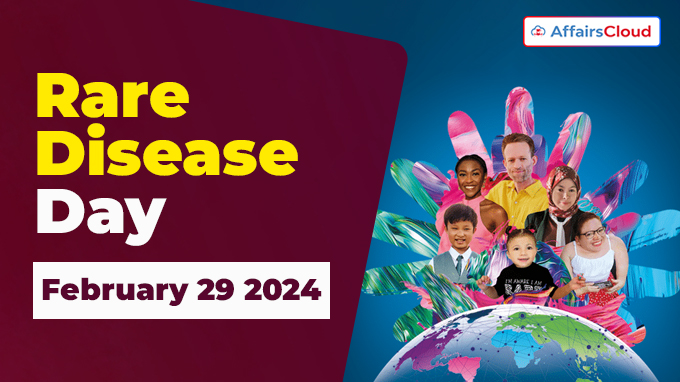 Rare Disease Day is annually observed across the globe on the last day of February, either 28 or 29 in leap years (the rarest day of the year), to raise awareness of the rare diseases and their impact on the people they affect.
Rare Disease Day is annually observed across the globe on the last day of February, either 28 or 29 in leap years (the rarest day of the year), to raise awareness of the rare diseases and their impact on the people they affect.
- This Day also aims to build a community and promote equity in healthcare access, treatment, care, and social opportunities for individuals with rare diseases.
Rare Disease Day 2024, observed on 29 February 2024, marks the 17th Observance of Rare Disease Day.
Theme:
The 2024 theme of Rare Disease Day is “Share Your Colours”. This theme is the continuation of the 2022 and 2023 themes.
- The theme highlights the significance of collaboration and support for those individuals affected by rare diseases.
Background:
i.Rare Disease Day was launched by the European Organisation for Rare Diseases (EURORDIS)-Rare Diseases Europe and its Council of National Alliances in 2008.
ii.The first Rare Disease Day was observed in 2008 with events in 18 countries.
iii.Since 2008, the Rare Disease Day events have been held in over 100 countries.
Note: EURORDIS-Rare Diseases Europe is a non-governmental, non-profit alliance of over 1000 rare disease patient organisations from 74 countries and individuals active in the field of rare diseases in Europe.
Why February 29?
The date 29 February was selected for observing ‘Rare Disease Day’ as it is a rare day that comes once every 4 years.
What is a Rare Disease?
i.A disease is called Rare when it affects fewer than 1 in 2000 people.
ii.These are severe and affect multiple organs in the body. They are marked by progressive illness and often lead to disability and premature death.
Key Facts:
i.There are over 6000 different rare diseases are identified and more than 300 million people worldwide live with a rare disease.
ii.72% of rare diseases are genetic and almost 1 out of 5 cancers is rare.
iii.70% of these genetic rare diseases start in childhood.
#ActRare2024 Campaign:
i.EURORDIS-Rare Diseases Europe launched the #ActRare2024 campaign on the occassion of Rare Disease Day 2024.
ii.It outlined 8 key policy demands of the European rare disease community for the European Union’s (EU) next decision-makers, ensuring the momentum for change is sustained.
Key Points:
i.In India, Organization for Rare Diseases India (ORDI), a non-profit organisation, works to address the many challenges in the management of rare diseases.
ii.ORDI ensures accessibility of resources to patients with rare diseases and promotes awareness about such diseases.




